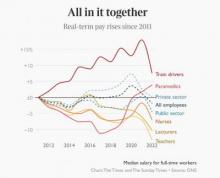SFEU Marketisation of Higher Education statement
As many higher education institutions are on the brink of financial collapse, it’s time to understand what has brought about this perfect storm and what can be done about it.
Headlines often focus on ‘over-reliance on international students’ but it is more complex than that. Why do you think universities try so hard to recruit international students?... because their fees are not regulated, and universities can charge what they think they can get away with given market forces; i.e. Cambridge can charge a student from China more than Cardiff Met can. So, are they just being greedy in recruiting internationally? Not really – what they are trying to do is cover the short-fall that arises when domestic student fees have barely risen in over ten years.









